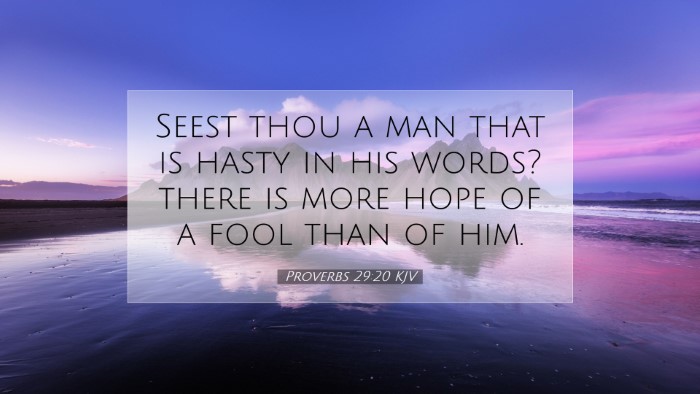Commentary on Proverbs 29:20
Verse: “Seest thou a man that is hasty in his words? there is more hope of a fool than of him.” (Proverbs 29:20, KJV)
Overview
This poignant verse encapsulates the theme of wisdom and speech, warning against the perils of impulsive words. A careful examination draws from a variety of public domain commentaries, primarily Matthew Henry, Albert Barnes, and Adam Clarke, providing a multifaceted perspective.
Key Insights
1. The Nature of Hasty Words
Matthew Henry emphasizes that this verse serves as a caution against the reckless and hasty speech that often leads to misunderstandings and conflict. He asserts that words spoken without careful thought are a reflection of poor judgment and lack of discernment. Henry urges readers to contemplate the implications of their words before speaking.
Albert Barnes expands on this idea by observing that those who are quick to speak often do so out of a desire to be heard, rather than to convey wisdom. Such a tendency can often overshadow genuine insight. Barnes notes that the verse indicates more danger lies within those who are rash in their speech than in fools, who may at least have the capacity for reflection and learning.
Adam Clarke adds that hasty words can lead to serious consequences, often resulting in regret. He notes that the emotional state often drives hasty speech, suggesting that individuals must cultivate patience and self-control to avoid the pitfalls of thoughtless expression.
2. The Comparison: Hasty Speaker vs. Fool
The verse draws a startling comparison: a man who is hasty in his words is still worse off than a fool.
Matthew Henry interprets this to mean that while fools may say foolish things, they may still possess some potential for growth, while the hasty speaker lacks the humility to pause and reflect.
Albert Barnes reinforces this idea by highlighting that the hasty individual shows a lack of wisdom and discernment that exceeds even that of fools, who may still be amenable to correction. This elevates the seriousness of the matter, prompting individuals to exercise caution in their speech.
3. Practical Applications for Spiritual Leaders
For pastors and spiritual leaders, this verse underscores the importance of thoughtful communication.
Matthew Henry advises that leaders should exemplify wisdom in their speech, as their words carry significant weight and influence in the lives of others.
Albert Barnes further suggests that a good leader should practice restraint, fostering environments where careful listening accompanies speech. Strong leadership is marked not merely by authority but by the wisdom of measured, deliberate communication.
Adam Clarke concludes that leaders must be particularly vigilant against hasty remarks, for their roles require a level of responsibility and consideration that cannot afford imprudent words.
Such leaders will reflect Christ’s example, who often engaged thoughtfully before responding.
Conclusion
Proverbs 29:20 serves as a vital reminder for all, especially those entrusted with teaching and leading others in faith. Hasty words not only jeopardize relationships and understanding but also reflect a profound spiritual immaturity.
The insights gleaned from public domain commentaries reveal a deeper understanding of the necessity for patience, discernment, and humility in our communication. By choosing our words carefully, we cultivate wisdom and reflect the character of Christ to those around us.


